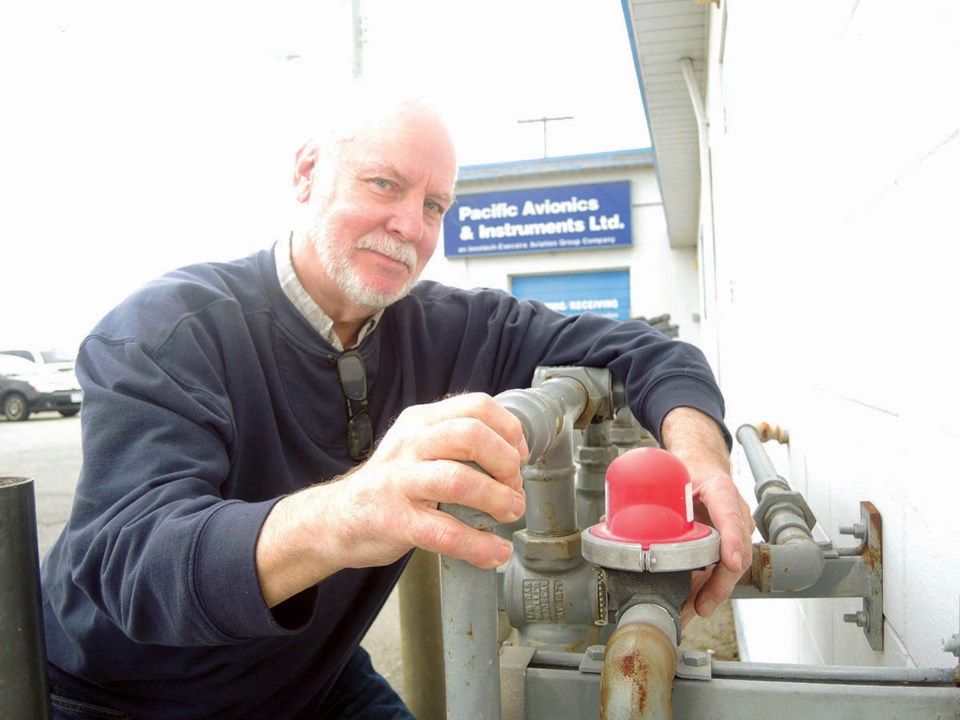On the rare occasion when we talk seriously about earthquakes in Richmond, words such as “tsunami” and “liquefaction” pop up.
If Richmond was affected by a 7.8-magnitude earthquake — such as the recent, devastating one in Nepal — most of our newer buildings would withstand the seismic shake due to modern codes.
Rarely, however, do we talk about the threat of fire; caused, in particular, by explosions from fractured gas lines.
“Engineers had the foresight in California to come up with these valves — which shut off the gas in the event of an earthquake — because they realized that the biggest threat is actually from fire. I completely agree with them,” said John O’Sullivan, president and co-founder of Richmond-based QuakeKoso, which is the authorized distributor in Canada for (Koso) California Seismic Gas Shut Off Valves.
“If you can shut off the gas, it’s not just the economics of not losing your building, it’s also the preservation of life.”
QuakeKoso installed its first valve — which are eight inches tall (domestic ones are only one-inch), weighing 50 pounds — at Vancouver General Hospital almost 25 years ago to the day. And only last month, Richmond Hospital became the last major, acute care facility in the Lower Mainland to have the same installation.
“We’ve fitted thousands of valves in just about every school on the west coast of Canada and all the major hospitals,” added O’Sullivan, who pointed to the devastation caused by fire after the 1995 earthquake in Kobe, Japan, where fires raged for 10 days, with 23,000 homes destroyed and thousands dead.
“There’s about 800,000 users of natural gas in B.C., perhaps about half a million buildings and maybe only 5,000 of them, or one per cent, have the safety net of this valve
“Many of them probably don’t know it exists. But one day, we are going to have an earthquake and I will be inundated after it. However, it might be too late by then.”
QuakeKoso’s client list stretches from government and institution buildings such as B.C. Hydro’s head office to the City of Victoria to Richmond School District.
In this week of Emergency Preparedness Week across the province, B.C. is doing a decent enough job, said O’Sullivan.
“We focus well on the important things; the before, the during and the after and what could fall off and kill a child,” he said.
“But there’s still not enough attention to the danger of fire; it’s somewhat off the radar since the provincial government’s Seismic Mitigation Program was phased out in 2003.
“And it’s still very difficult for many people to believe we’re going to have an earthquake; there’s actually only been six damaging earthquakes in northern California, while we’ve had eight smaller ones from Seattle to Port Hardy in recent years.”
As part of the aforementioned Emergency Preparedness Week, Richmond residents and businesses are being encouraged by the city to sign up to receive voice or text messages through “Richmond BC Alert,” the city’s new emergency notification system at www.RichmondBCAlert.ca.
Richmond residents and businesses may register up to six phone numbers; two email addresses, one SMS text and one fax number for each local address.
When an emergency occurs, voice or text messages will be sent to all registered contacts in the impacted area. Evacuation notices, emergency instructions, direction to emergency reception centres or shelters, and information on family reunification will be among the messages that could be sent out during an emergency situation.
While the city has access to some resident and business contact information through publicly available sources such as the White Pages, this only represents a small portion of personal phones, cell phones, emails and other contacts relied upon by local residents and businesses to stay connected.
The website began accepting registrations on Friday, May 1. Residents can also register by calling 604-233-3333 from 8:15 a.m. to 5 p.m. weekdays.
Residents can also sign up in person and learn more about emergency preparedness from noon to 9 p.m. on Friday, May 8 in Minoru Park as part of Emergency Preparedness Week. There will be a number of information booths and giveaways related to emergency preparedness and people can take a ride in Quake Cottage, which simulates the impact of an 8.0-magnitude earthquake on home and office spaces.
Richmond residents and businesses that follow Twitter are also encouraged to follow the city’s dedicated emergency Twitter feed @RichmondBCAlert.



